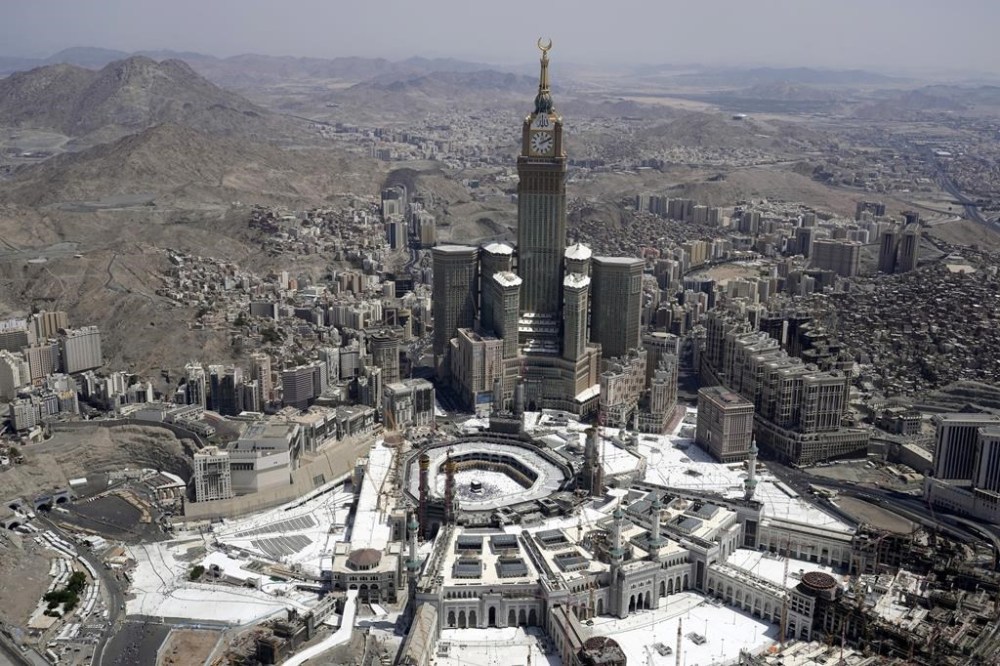Saudi Arabia: Hajj pilgrimage returning to pre-COVID levels
Advertisement
Read this article for free:
or
Already have an account? Log in here »
To continue reading, please subscribe:
Monthly Digital Subscription
$0 for the first 4 weeks*
- Enjoy unlimited reading on winnipegfreepress.com
- Read the E-Edition, our digital replica newspaper
- Access News Break, our award-winning app
- Play interactive puzzles
*No charge for 4 weeks then price increases to the regular rate of $19.00 plus GST every four weeks. Offer available to new and qualified returning subscribers only. Cancel any time.
Monthly Digital Subscription
$4.75/week*
- Enjoy unlimited reading on winnipegfreepress.com
- Read the E-Edition, our digital replica newspaper
- Access News Break, our award-winning app
- Play interactive puzzles
*Billed as $19 plus GST every four weeks. Cancel any time.
To continue reading, please subscribe:
Add Free Press access to your Brandon Sun subscription for only an additional
$1 for the first 4 weeks*
*Your next subscription payment will increase by $1.00 and you will be charged $16.99 plus GST for four weeks. After four weeks, your payment will increase to $23.99 plus GST every four weeks.
Read unlimited articles for free today:
or
Already have an account? Log in here »
Hey there, time traveller!
This article was published 09/01/2023 (1063 days ago), so information in it may no longer be current.
DUBAI, United Arab Emirates (AP) — Islam’s annual hajj pilgrimage in Saudi Arabia will return to pre-pandemic levels this year after restrictions saw the annual religious commemoration curtailed over concerns about the coronavirus, authorities say.
The hajj, required of all able-bodied Muslims once in their life, represents one of the world’s largest gatherings of people. Before the pandemic, the pilgrimage drew millions each year to Islam’s holy city of Mecca, home to the cube-shaped Kaaba that observant Muslims pray toward five times a day.
In 2019, over 2.4 million people took part in the pilgrimage. But in 2020, amid the lockdowns sparked by the pandemic, Saudi Arabia drastically curtailed the hajj with as as few as 1,000 residents of Saudi Arabia permitted to take part. It was an unprecedented move unseen even during the 1918 flu epidemic that killed tens of millions worldwide.

In 2021, some 60,000 residents of Saudi Arabia attended. Last year saw 1 million faithful perform the pilgrimage.
Speaking on Monday night at a conference about the hajj in the Red Sea port city of Jeddah, Saudi Hajj and Umrah Minister Tawfiq bin Fawzan al-Rabiah announced the lifting of the restrictions.
“I bring you two bits of good news in this meeting. The first: The return of the numbers of pilgrims to what they were before the pandemic without any age restrictions,” al-Rabiah said, according to the state-run Saudi Press Agency.
“And the second: Allowing any hajj mission from around the world to deal with any licensed company that meets the requirements of the pilgrims of those countries,” he added.
Only those between the ages of 18 to 65 could attend the hajj in recent years. Saudi Arabia also had limited which private companies could conduct travel arrangements for the hajj.
The coronavirus isn’t the first public health disaster to strike the hajj. The kingdom’s Al Saud ruling family stakes its legitimacy in this oil-rich nation on overseeing and protecting the hajj sites. Ensuring the hajj happens has been a priority for them — and also a main economic driver bringing billions of dollars of non-oil revenue to Saudi Arabia.
Disease outbreaks have always been a concern surrounding the hajj. Pilgrims fought off a malaria outbreak in 632, cholera in 1821 killed an estimated 20,000, and another cholera outbreak in 1865 killed 15,000 before spreading worldwide.
More recently, Saudi Arabia faced danger from a different coronavirus, one that causes the Middle East respiratory syndrome, or MERS. The kingdom increased its public health measures during the hajj in 2012 and 2013, urging the sick and the elderly not to take part.
In recent years, Saudi officials also instituted bans on pilgrims coming from countries affected by the Ebola virus.
It wasn’t immediately clear what health precautions would be taken for the hajj, which falls according to the lunar-based Islamic calendar this year at the end of June. While Saudi Arabia has no requirement for coronavirus vaccines or testing, it does require pilgrims to be vaccinated for other maladies.
Muslims have been prohibited from kissing or touching the cube-shaped Kaaba, the metaphorical house of God at the center of Mecca that pilgrims circle as they complete the hajj.
The hajj also involves close contact in large crowds, which in 2015 saw over 2,400 people killed in a crush and stampede.
___
Follow Jon Gambrell on Twitter at www.twitter.com/jongambrellAP.
The Free Press acknowledges the financial support it receives from members of the city’s faith community, which makes our coverage of religion possible.

